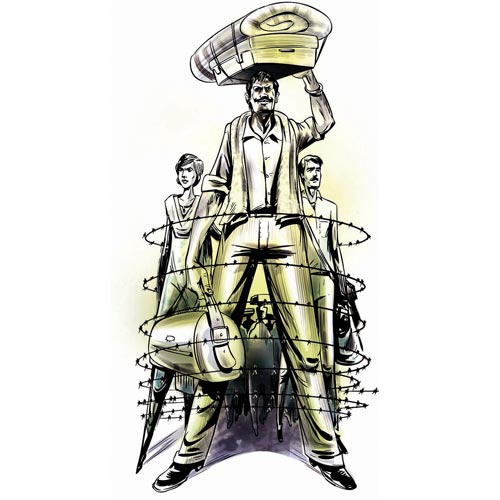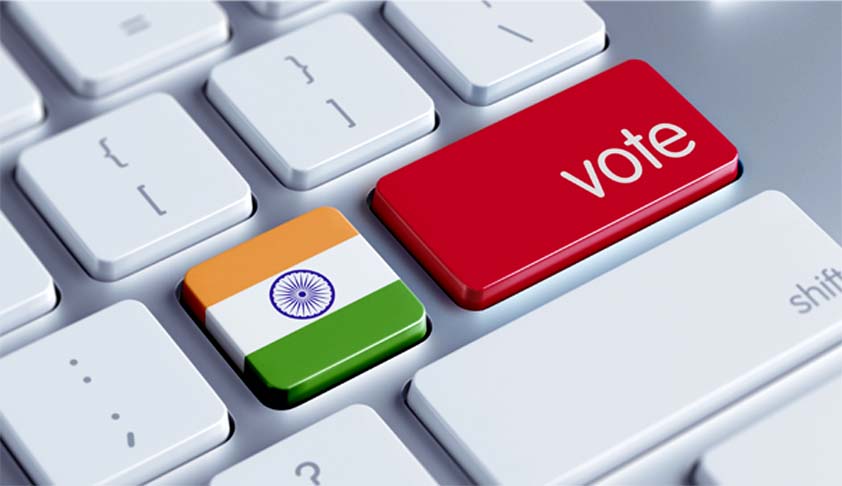Domestic migrants may get to vote during
polls in native places
 |
· Millions of domestic migrants in India may soon get to vote in elections
in their native areas without leaving their places of employment if a government proposal to extend
postal ballot facilities to them is successful.
· A committee of ministers has been asked to examine the possibility of
allowing the choice of postal ballots - both electronically and through proxy
voters - to domestic migrant labourers and workers,
in consultation with the election commission.
· But the facility may take a few years to materialise throughout India as
the poll panel will have to create an elaborate mechanism for its
implementation for domestic workers.
· The EC estimates around 12-15% of the 815 million voters
in India fall in the migrant category, based on an analysis of the
frequent changes made in electoral rolls.
· But a vast majority of these eligible voters don't get to exercise their
franchise when polls are held in their native areas as most cannot afford to
travel or miss work.
· A National Sample Survey Office survey in 2007-08 said around 29% of Indians were migrants,
moving mostly from rural to urban areas. Moreover, a comparison of the 2001 and
2011 census figures showed a four
percentage point jump in the proportion of India's urban population.
· With such large numbers of eligible poor voters left out because of
work-related migration, government sources said the prime minister's office
asked an informal ministerial group to examine whether domestic migrant workers
can get facilities as proposed to be given to non-resident Indians.
What about the NRIs ?
 |
· In 2014, the Supreme Court had asked the EC to consider allowing NRIs to vote from their place of
employment.
· The poll panel recommended a new e-postal ballot system
and extension of the existing proxy-voting facility for NRI voters from their
place of residence abroad, and was accepted by the government.
· The
amendments will be a blessing for thousands of Indian's living abroad. Not only
for the Wall Street banker in New York but also for the house-help in Dubai, or
the builder in Jeddah. India has over one crore NRIs,
who were initially required to fly back to India in order to vote.
 |
· Issues
involved :-- The largest portion of Indians living abroad are in Gulf
countries and most of them work as domestic help, drivers or construction
workers. These Indians will find it difficult to prove their identity as they
have to give up their passports to their employees for "safe keeping".
What about
defence personnels ?
· The government also decided to extend e-postal ballots to defence personnel and those on election duty.
What
exactly is the e-postal system ?
· In e-postal system, the ballot paper is emailed to the voter at a
dedicated email address and the person is required to send the marked ballot paper
through post to the returning officer of the constituency where he or she is a
registered voter.
· These postal votes are counted before the regular process of counting of
votes is done.
And what is proxy voting system ?
· In the case of proxy voting, a person can authorise a family member to
vote on their behalf after getting an authorisation letter signed by his
superior or a magistrate. The authorisation document has to be sent to the
returning officer of the constituency where he or she has a vote.
Of recent what is the Law ministry doing ?
· The law ministry recently circulated a cabinet note seeking an amendment
in section 60 of the Representation of
People's Act to provide an option of voting in person, by proxy or by
postal ballots ------ including e-postal ballots to overseas voters, services
voters, armed forces personnel and their spouses to exercise their franchise.
· The note was approved by the ministries of finance, home and external
affairs before the PMO sought expansion of the proposed amendment.
What is the response of the Election Commission ?
· EC sources said the proposal can be implemented once electoral rolls are
cleaned of duplicate voters and there is a unique voter identity number for
each voter. The EC has already created a digital national electoral roll and
promises to remove most duplicates by next year.

